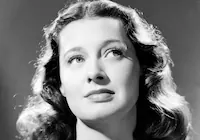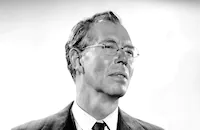Sing While You Dance
Brief Synopsis
Cast & Crew
D. Ross Lederman
Ellen Drew
Robert Stanton
Andrew Tombes
Edwin Cooper
Robert Stevens
Film Details
Technical Specs

Synopsis
Hoping to find a job as a "song plugger," Susan Kent goes to the heart of New York City's famous Tin Pan Alley, the center of deal making between popular songwriters and music publishers. Although her father was a noted songwriter, Susan is unable to interest publisher Davidson in her talents, and she is quickly escorted out of his office. On her way out, however, Davidson's secretary shows Susan a newspaper article about the glamorous singer Brenda Cartwright, and the article gives Susan an idea: In order to get her foot in the door of the office across the hall, Susan impersonates Miss Cartwright on the telephone and tells the agency to expect her agent, "Miss Kent." The Gorman Agency falls for Susan's ploy, and Susan is granted a meeting with Johnny Crane, a handsome, young song plugger with the agency. After meeting with Gorman, Susan makes a date with Johnny and then returns to the boardinghouse where she lives. Later, at a nightclub, Johnny realizes that Susan lied about being Brenda's agent when Brenda walks by Susan without noticing her. When Gorman, who has heard the truth about Susan from Davidson, accuses her of being a fraud, Susan tells Johnny that all she wanted was an opportunity to be a song plugger. Hoping to prove her natural talent for picking hit songs, Susan makes a wager with Johhny that she can make a hit out of one of the songs in his collection in two week's time. Johnny accepts the wager and tells her that if she succeeds, he will get her the job she wants. During the two weeks, a romance flourishes between Johnny and Susan, and on the last day before her two-week deadline expires, Susan surprises Johnny by arranging to have her roommate, Gloria Mundy, sing one of Johnny's songs at a nightclub. The song, written by R. J. Smith, becomes an instant sensation, and, as a result, Susan is hired by Gorman. She does so well that Gorman begins to question Johnny's worth, which prompts Johnny to quit and go to work for Davidson. When Gorman gives Susan one day to find a new song by composer R. J. Smith, she goes to Smith's home town in Connecticut. Johnny overhears the assignment and follows her there, but neither of them are able to find a man by the name of R. J. Smith. Susan and Johnny eventually discover that R. J. Smith has died and that his widow Abigail is unaware of her husband's song writing hobby. Susan is later caught searching through R. J. Smith's belongings, looking for a song, and is arrested. Johnny, too, is arrested, and both receive word by telegram that they have been fired. Susan tries to prove to Abigail that R. J. was a popular song writer, but she refuses to believe that he would be involved in such "frivolous" work. After returning to New York alone, Susan combines Smith's music with Johnny's lyrics to create a hit song. Despite Abigail's protests, Gloria performs the song at the Amethyst Club, and Johnny and Susan join in for the finale. Johnny and Susan then resume their romance and are married sometime later.

Director

D. Ross Lederman
Cast

Ellen Drew
Robert Stanton
Andrew Tombes
Edwin Cooper
Robert Stevens
Ethel Griffies
Amanda Lane
Eddy Waller
Paul E. Burns
Eddie Parks
Bert Roach
Mary Gordon

Walter Baldwin
Trevor Bardette
Jean Donahue
Crystal Reeves
Virginia Hunter
Gino Corrado
Dick Winslow
Buddy Gorman
Crew
Leon Barsha
Juanita L. Bell
Robert Stephen Brode
Sammy Cahn
Milton Drake
Lorraine Edwards
Philip Faulkner
Milton Feldman
Doris Fisher
Jack Goodrich
Roy Hamilton
Gene Havlick
Irving M. Klein
George Lait
George Meehan
Paul Mertz
William Montague
George Montgomery
Ben Oakland
Cary Odell
Allan Roberts
Allen Siegler
Jule Styne

Film Details
Technical Specs

Articles
Ellen Drew, 1914-2003
She was born Esther Loretta "Terry" Ray on November 23, 1914, in Kansas City, Missouri. The daughter of a barber, her family moved to Chicago when she was still an infant and she lived a very quiet childhood far removed from the glamour of Hollywood. She was encouraged by some friends to enter a beauty contest when she was just 17. After winning, she tried her luck in Hollywood, but found that they were no immediate offers for her particular talents.
She eventually took a waitressing job at C.C. Brown's, a famed Hollywood Boulevard soda fountain, and had virtually abandoned her dreams as a starlet when William Demarest, a popular actor's agent and well-known character actor, spotted her. Demarest arranged a screen test for her at Paramount, and she was promptly placed under contract for $50 a week.
For the first few years, (1936-38), Drew got only bit parts, and was often uncredited. When she finally got prominent billing in the Bing Crosby musical Sing You Sinners (1938), she decided to change her name, from Terry Ray to Ellen Drew. She earned her first major role in Frank Lloyd's If I Were King (1938) opposite Ronald Colman, yet for the most part of her career, rarely rose above "B" material and second leads. Still, she had some fine exceptions: Preston Sturges' enchanting comedy Christmas in July (1940), with Dick Powell; Tay Garnett's lighthearted war romp My Favorite Spy (1942) co-starring Kay Kyser; Julien Duvivier's taut The Imposter (1944), holding her own with a brooding Jean Gabin; and Mark Robson's chilling low-budget chiller Isle of the Dead (1945) opposite Boris Karloff. Drew made some notable television appearances in the late '50s including Perry Mason and The Barbara Stanwyck Show, before retiring from the entertainment industry. She is survived by her son David; five grandchildren; and five great-grandchildren.
by Michael T. Toole

Ellen Drew, 1914-2003
Quotes
Trivia
Notes
A November 1945 Hollywood Reporter news item noted that Columbia executive producer B. F. Zeidman was set to produce this film with Alexis Thurn-Taxis, who was named as his associate producer, beginning on January 9, 1946. A January 1946 Hollywood Reporter news item indicates that actress Lynn Merrick was originally set for the part played by Ellen Drew. The film marked Drew's first under her Columbia contract. Although onscreen credits list Allen Siegler as the film's photographer, Hollywood Reporter production charts list George Meehan in that capacity.














